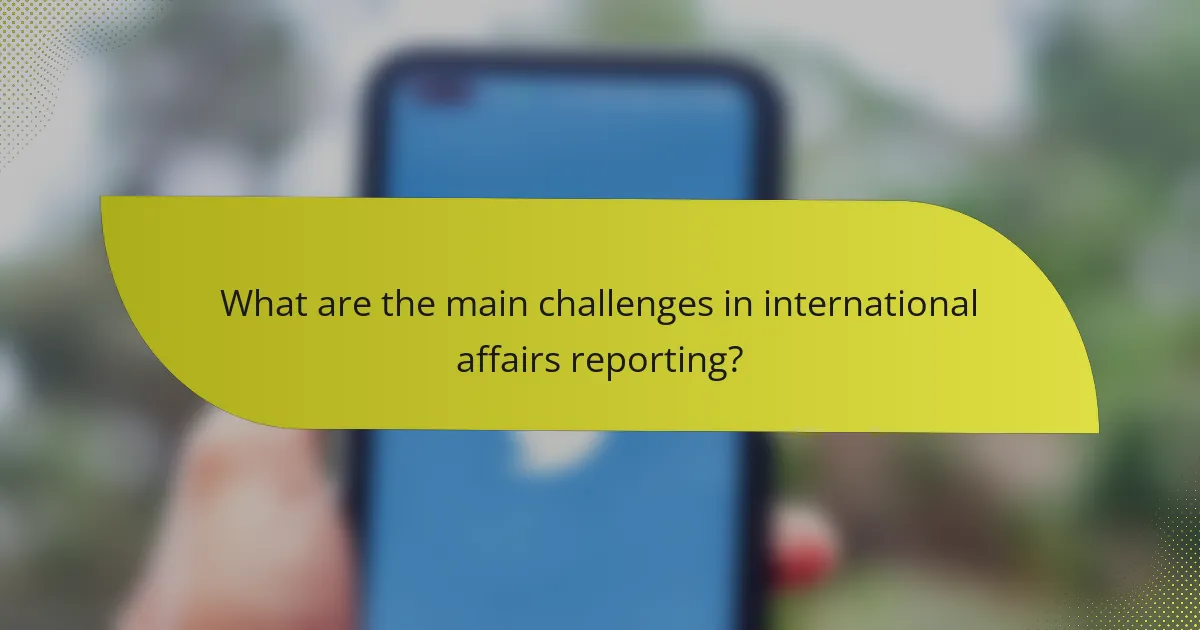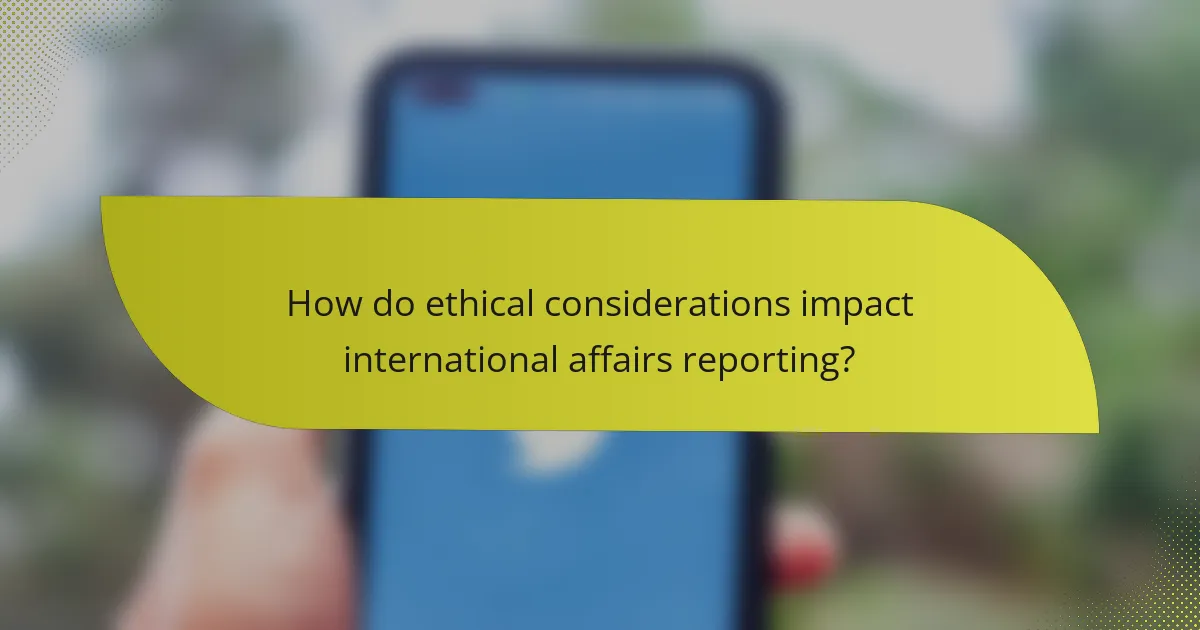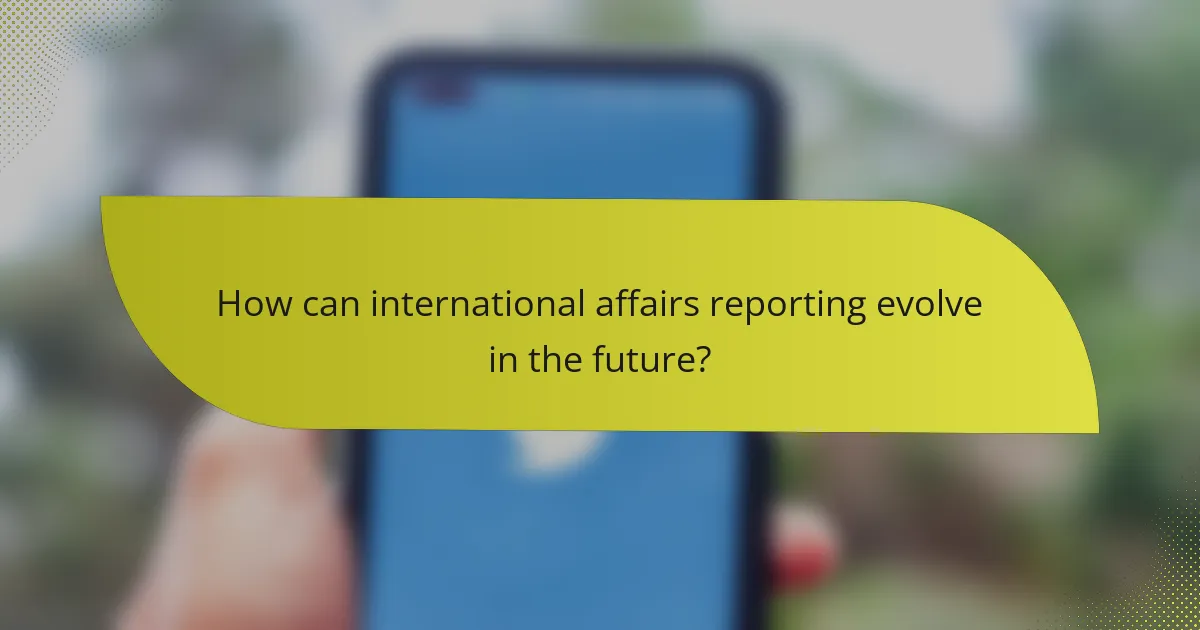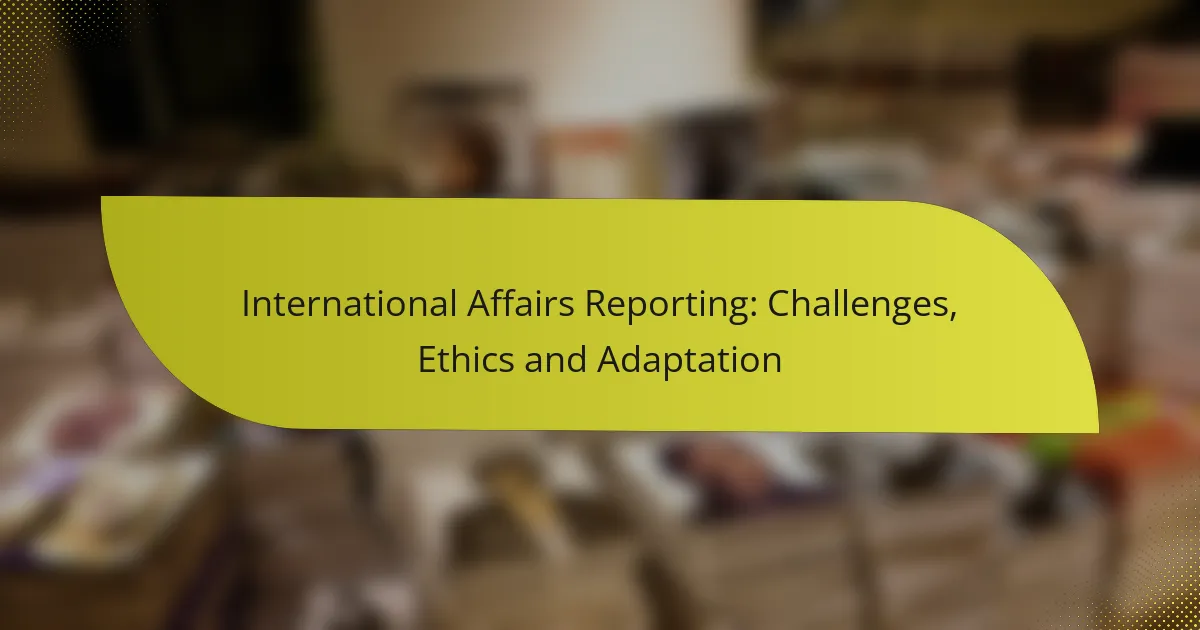International affairs reporting is fraught with challenges such as access to reliable information, political bias, and journalist safety, all of which can compromise the accuracy of news coverage on critical global issues. Ethical considerations are paramount, guiding journalists to balance truth-seeking with confidentiality and public perception. To navigate these complexities, journalists must adapt by leveraging new technologies, building community ties, and collaborating with international organizations, ensuring their reporting remains relevant and credible in a rapidly changing media landscape.

What are the main challenges in international affairs reporting?
International affairs reporting faces several significant challenges, including access to reliable information, political bias, and the safety of journalists. These obstacles can hinder accurate reporting and affect the overall quality of news coverage on global issues.
Access to reliable information
Accessing reliable information is a primary challenge in international affairs reporting. Journalists often rely on a mix of official sources, local contacts, and independent investigations to gather facts. However, in many regions, especially those with restrictive regimes, obtaining accurate data can be difficult.
To enhance credibility, reporters should cross-check information from multiple sources and utilize established networks. Engaging with local experts and organizations can also provide valuable insights and context.
Political bias and censorship
Political bias and censorship significantly impact international reporting. Governments may manipulate information or impose restrictions on media outlets, leading to skewed narratives. Journalists must navigate these political landscapes carefully to maintain objectivity.
To mitigate bias, reporters should strive for balanced coverage by representing diverse viewpoints. Understanding the political context of a region can help journalists identify potential biases in the information they receive.
Safety of journalists
The safety of journalists is a critical concern in international affairs reporting. Many reporters face threats, harassment, or violence, particularly in conflict zones or authoritarian countries. Ensuring their safety is paramount for the integrity of the reporting process.
Journalists should adopt safety protocols, including risk assessments and secure communication methods. Collaborating with local organizations can provide additional support and resources for navigating dangerous environments.
Language barriers
Language barriers pose a significant challenge in international reporting, as journalists often work in regions where they may not speak the local language. This can lead to misunderstandings and misinterpretations of crucial information.
Using professional translators or local fixers can help bridge the language gap. Additionally, journalists should familiarize themselves with key terms and phrases relevant to the region to enhance communication and comprehension.
Technological limitations
Technological limitations can hinder international affairs reporting, particularly in areas with poor infrastructure or limited internet access. Journalists may struggle to transmit stories or gather information in real-time due to these constraints.
To overcome these challenges, reporters should utilize offline tools and apps that allow for data collection and storage without immediate internet access. Planning ahead and establishing backup communication methods can also ensure continuity in reporting efforts.

How do ethical considerations impact international affairs reporting?
Ethical considerations play a crucial role in international affairs reporting by guiding journalists in their pursuit of truth while balancing the need for confidentiality and the potential impact on public perception. These ethical dilemmas shape the integrity and credibility of news coverage, influencing how information is presented and received by audiences.
Accuracy and truthfulness
Accuracy and truthfulness are foundational to ethical reporting in international affairs. Journalists must verify facts from multiple sources to ensure that the information presented is correct and reliable. This often involves cross-referencing data, consulting experts, and being aware of biases that may affect the narrative.
For instance, when reporting on conflict zones, it is essential to distinguish between verified reports and unconfirmed claims to avoid spreading misinformation. A commitment to accuracy not only builds trust with the audience but also upholds the journalist’s responsibility to inform the public accurately.
Confidentiality of sources
Maintaining the confidentiality of sources is a critical ethical consideration in international affairs reporting. Journalists often rely on anonymous sources to obtain sensitive information, especially in politically volatile regions. Protecting these sources can encourage whistleblowers to come forward without fear of retribution.
However, this confidentiality must be balanced with the need for transparency. Journalists should evaluate the credibility of their sources and consider the potential consequences of revealing their identities, ensuring that the public interest is served without compromising individual safety.
Impact on public perception
The way international affairs are reported can significantly influence public perception and opinion. Ethical reporting requires journalists to present information in a manner that is fair and balanced, avoiding sensationalism that could skew public understanding. This is particularly important in issues related to national security or humanitarian crises.
For example, framing a conflict as a “war” versus a “military operation” can shape how audiences perceive the legitimacy and severity of the situation. Journalists should strive to provide context and multiple viewpoints to foster a well-rounded understanding among their readers.
Responsibility to report
Journalists have a responsibility to report on international affairs in a way that informs the public while considering the ethical implications of their coverage. This includes weighing the potential harm that certain information may cause against the public’s right to know. Ethical reporting often involves making tough decisions about what to publish and what to withhold.
For instance, revealing sensitive information about a government’s military strategy could endanger lives, while withholding critical information about human rights abuses could prevent accountability. Journalists must navigate these dilemmas thoughtfully, prioritizing the greater good while adhering to ethical standards.

What strategies can journalists use to adapt to changing landscapes?
Journalists can adapt to changing landscapes by embracing new technologies, fostering community relationships, and collaborating with international organizations. These strategies help maintain relevance and credibility in an evolving media environment.
Utilizing digital platforms
Digital platforms are essential for modern journalism, allowing for rapid dissemination of information and engagement with audiences. Journalists should leverage social media, blogs, and multimedia content to reach diverse demographics and enhance storytelling.
Consider using platforms like Twitter for real-time updates and Instagram for visual storytelling. Engaging with audiences through comments and direct messages can also build trust and foster a loyal following.
Engaging with local communities
Building relationships with local communities is crucial for journalists to gain insights and establish credibility. Engaging directly with residents can provide unique perspectives and uncover stories that may not be visible from a distance.
Attend community events, conduct interviews, and collaborate with local organizations to understand the issues that matter most to residents. This approach not only enriches reporting but also strengthens community ties.
Collaborating with international organizations
Partnerships with international organizations can enhance journalistic efforts by providing resources, expertise, and access to global networks. These collaborations can help journalists cover complex issues such as human rights, climate change, and international conflicts more effectively.
Seek out alliances with NGOs, think tanks, and media networks that align with your reporting goals. Sharing resources and knowledge can lead to more comprehensive and impactful stories.

What role does technology play in international affairs reporting?
Technology significantly enhances international affairs reporting by providing tools for data collection, analysis, and dissemination. It enables journalists to access real-time information, engage with global audiences, and utilize innovative methods for storytelling.
Use of data journalism
Data journalism involves the use of quantitative data to uncover trends and insights in international affairs. Journalists can analyze large datasets to provide context and depth to their reports, making complex issues more understandable for the audience.
For instance, using statistical software, reporters can visualize migration patterns or economic indicators, allowing readers to grasp the implications of these trends. Effective data journalism often requires collaboration with data scientists to ensure accuracy and clarity.
Social media as a reporting tool
Social media platforms serve as vital tools for international affairs reporting by facilitating immediate communication and audience engagement. Journalists can share breaking news, gather public opinions, and monitor real-time developments across the globe.
However, reliance on social media can lead to challenges such as misinformation. Reporters should verify sources and cross-check facts before disseminating information to maintain credibility and trust with their audience.
Emerging AI tools for analysis
Emerging AI tools are transforming how journalists analyze data in international affairs reporting. These technologies can process vast amounts of information quickly, identifying patterns that may not be immediately apparent to human analysts.
For example, AI algorithms can sift through news articles, social media posts, and official documents to highlight emerging trends or potential crises. Journalists should consider integrating AI tools into their workflows while remaining aware of ethical implications, such as bias in algorithms and the importance of human oversight.

How can international affairs reporting evolve in the future?
International affairs reporting can evolve by embracing technology, enhancing ethical standards, and adapting to changing audience needs. This evolution will involve integrating new media platforms, improving transparency, and fostering collaboration among journalists globally.
Embracing Technology
The future of international affairs reporting will heavily rely on technological advancements. Journalists can utilize artificial intelligence for data analysis, enabling them to uncover trends and insights more efficiently. Additionally, the use of virtual reality can provide immersive experiences that enhance storytelling.
Social media platforms will continue to play a crucial role in disseminating news quickly. However, it is essential for reporters to verify information before sharing to combat misinformation. Tools like fact-checking software can assist in maintaining credibility.
Enhancing Ethical Standards
As international affairs reporting evolves, maintaining high ethical standards is paramount. Journalists must prioritize accuracy, fairness, and transparency in their reporting. This includes disclosing sources and potential conflicts of interest to build trust with the audience.
Furthermore, training programs focused on ethical journalism can help reporters navigate complex situations, especially in conflict zones. Adhering to established guidelines, such as those from the Society of Professional Journalists, can provide a solid framework for ethical decision-making.
Adapting to Changing Audience Needs
International affairs reporting must adapt to the evolving preferences of audiences. Younger generations often seek concise, engaging content that can be consumed quickly. Journalists should consider using multimedia elements like videos and infographics to present complex information more digestibly.
Engaging with audiences through interactive platforms can also foster a sense of community and encourage dialogue. Polls, live Q&A sessions, and comment sections can provide valuable feedback and insights into audience interests, helping reporters tailor their content effectively.
